(Winter, 2016)
![]()
![]()
| Meets: TR 12:10-2:00 PM in 33-286
Office: 47-35G, tel. 756-2636 Office Hours: TR 8:10-9:00 AM in 2-13 (not in my office); T 2:10-3:00 PM and W 8:10-9:00 AM in 47-35G; and by appt. |
 |
Dr. Debora B. Schwartz
http://cola.calpoly.edu/~dschwart Main English Office: 805-756-2597 e-mail: dschwart@calpoly.edu |
![]()
![]() Site Navigation
Site Navigation
|
||
|
||
![]()
![]()
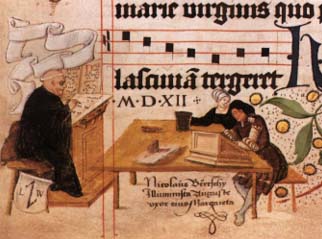 ENGL 252-01 covers a
selection of "Great Books" from the European Middle Ages and early
modern period. In addition to introducing you to the authors
and works on our syllabus, the course aims to familiarize you with
medieval and early modern attitudes toward authorship and
textuality, with medieval and early modern modes of textual
production, and with specific textual practices relevant to the
interpretation of medieval and early modern literature. By the end
of the quarter, you will have become acquainted with a number of
significant authors and works of the 12th to 16th centuries, and
you will have gained an understanding of some key historical and
cultural developments during this period. You will know how
medieval and early modern literature differs from modern
literature (and from modern notions of what literature is):
e.g. the differences between manuscript and print cultures; the
tension between Latin and the vernacular languages; the emphasis
on literature as an on-going process rather than an end product;
and the absence of copyright (and thus the inappropriateness of
modern notions of "originality" or "intellectual property") in the
medieval and early modern context.
ENGL 252-01 covers a
selection of "Great Books" from the European Middle Ages and early
modern period. In addition to introducing you to the authors
and works on our syllabus, the course aims to familiarize you with
medieval and early modern attitudes toward authorship and
textuality, with medieval and early modern modes of textual
production, and with specific textual practices relevant to the
interpretation of medieval and early modern literature. By the end
of the quarter, you will have become acquainted with a number of
significant authors and works of the 12th to 16th centuries, and
you will have gained an understanding of some key historical and
cultural developments during this period. You will know how
medieval and early modern literature differs from modern
literature (and from modern notions of what literature is):
e.g. the differences between manuscript and print cultures; the
tension between Latin and the vernacular languages; the emphasis
on literature as an on-going process rather than an end product;
and the absence of copyright (and thus the inappropriateness of
modern notions of "originality" or "intellectual property") in the
medieval and early modern context.
![]() This large-lecture ENGL 252 will meet most of the learning
objectives
of a G.E. area C1 class: it will provide historical
perspective on several significant literary periods; cover a
range of literary genres and conventions; help you
understand both individual works and their relationship to the social,
cultural, and historical context in which they were written;
and foster an appreciation of the connections between literary
works and non-verbal forms such as the visual and/or
performing arts. Course readings and lectures will
encourage you to practice the skills necessary to read with
insight, engagement, and detachment and to analyze and
evaluate works from cultures which are unfamiliar to
you. While you will not yourself be able to practice your
writing skills in this class, lectures will endeavor to model some
of the analytic skills you would normally practice in an essay by
offering close reading of the texts under consideration.
This large-lecture ENGL 252 will meet most of the learning
objectives
of a G.E. area C1 class: it will provide historical
perspective on several significant literary periods; cover a
range of literary genres and conventions; help you
understand both individual works and their relationship to the social,
cultural, and historical context in which they were written;
and foster an appreciation of the connections between literary
works and non-verbal forms such as the visual and/or
performing arts. Course readings and lectures will
encourage you to practice the skills necessary to read with
insight, engagement, and detachment and to analyze and
evaluate works from cultures which are unfamiliar to
you. While you will not yourself be able to practice your
writing skills in this class, lectures will endeavor to model some
of the analytic skills you would normally practice in an essay by
offering close reading of the texts under consideration.
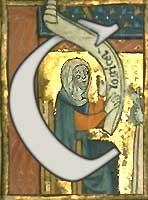 STATE
BUDGET CRISIS CONSEQUENCES: NO WRITING COMPONENT.
All
sections of ENGL 252 (including this large-lecture class) fulfill
the GE area C1 requirement and count as a prerequisite
for upper-division GE area C4 (GWR) classes. For this
reason, ENGL 252 is normally taught as a writing-intensive
course with a significant amount of in-class and
out-of-class writing. (By definition, a writing-intensive
class requires a minimum of 3000 words of writing and bases at
least 50% of the final course grade on writing assignments.) Due
to the state budget crisis, however, the English Department has
been required to offer large-lecture sections of C1 classes which
include content only with no writing
assignments and no writing instruction.
Because
there is no written work, the entire course grade will be based
upon your performance on objective-only scantron assessments.
All students will take two 100-pt. scantron
midterms and a 150-pt. scantron
final exam. Students are encouraged but not
required to prepare for those exams (and to lessen their impact on
the final course grade) by participating in scantron
reading
quizzes, administered at the beginning of each class
meeting.
STATE
BUDGET CRISIS CONSEQUENCES: NO WRITING COMPONENT.
All
sections of ENGL 252 (including this large-lecture class) fulfill
the GE area C1 requirement and count as a prerequisite
for upper-division GE area C4 (GWR) classes. For this
reason, ENGL 252 is normally taught as a writing-intensive
course with a significant amount of in-class and
out-of-class writing. (By definition, a writing-intensive
class requires a minimum of 3000 words of writing and bases at
least 50% of the final course grade on writing assignments.) Due
to the state budget crisis, however, the English Department has
been required to offer large-lecture sections of C1 classes which
include content only with no writing
assignments and no writing instruction.
Because
there is no written work, the entire course grade will be based
upon your performance on objective-only scantron assessments.
All students will take two 100-pt. scantron
midterms and a 150-pt. scantron
final exam. Students are encouraged but not
required to prepare for those exams (and to lessen their impact on
the final course grade) by participating in scantron
reading
quizzes, administered at the beginning of each class
meeting.
NOTE 1: Before rejoicing over "getting off easy" -- no essays to write! -- please consider that this lack of writing instruction comes at a cost to your education. While the readings and lectures in ENGL 252 are of intrinsic educational value, this quarter you will not get part of the education your tuition dollars are supposed to pay for: the practice in analytic writing that should be part of a C1 class and which would prepare you to earn GWR certification when you enroll in an upper-division C4 class. If you find it disturbing to pay increased academic fees for less instruction, please TALK ABOUT THE IMPACT OF THE STATE BUDGET CRISIS on YOUR education with your family and friends; let your LEGISLATORS know that the CSU needs additional funding; and let the UNIVERSITY ADMINISTRATION know that a "writing-intensive" course should not be forced to run at a size that precludes writing instruction!
![]()
You will be asked to select one of two grading options at the end of week two of class:
 Quiz Rationale: In
a large lecture class, it's easy to sit back and not engage with the
material. Quizzes are intended to "keep you honest" -- to give
you an incentive to complete reading assignments and to reward you
for regular attendance at lectures. Students electing the quiz
option are likely to end up with significantly higher course
grades. To prepare for quizzes, do the readings, using the Study guides, which are designed to draw
your attention to important points and passages in the
readings. You should also know the background information for
each primary text listed as "text info" on the course
calendar and compiled for your convenience in a Composite
Text Information page. Get in the habit of USING
these tools to prepare for class, and you should do very well on
daily quizzes.
Quiz Rationale: In
a large lecture class, it's easy to sit back and not engage with the
material. Quizzes are intended to "keep you honest" -- to give
you an incentive to complete reading assignments and to reward you
for regular attendance at lectures. Students electing the quiz
option are likely to end up with significantly higher course
grades. To prepare for quizzes, do the readings, using the Study guides, which are designed to draw
your attention to important points and passages in the
readings. You should also know the background information for
each primary text listed as "text info" on the course
calendar and compiled for your convenience in a Composite
Text Information page. Get in the habit of USING
these tools to prepare for class, and you should do very well on
daily quizzes. EXAMS: There will be three
scantron EXAMS: two 100-pt. Midterms (closed book, in class
on T 1/28 and Th 2/25) and a 150-pt.
closed-book Final Exam
(on Th 3/17, from 1:10 - 4:00 PM). The Final Exam
will be cumulative in some sections, while other sections will be
more like a midterm exam focusing on Shakespeare's A Midsummer
Night's Dream and the video versions of the play that were
screened in class (including both the the full Joseph Papp / Public Theatre production
screened in class and the clips from other
films screened during lectures). Bring a 100-question
scantron form for each midterm and TWO 100-question scantron forms
for the 150-pt. final exam. (DO NOT bring other sizes of scantrons
-- I will not be able to score them.)
EXTRA CREDIT: Individuals or small groups of students who have elected the Quiz option have the option of presenting a monologue or scene from A Midsummer Night's Dream the last day of class. Extra Credit performances must be approved by me in advance during an office hour meeting (your whole group must attend). Performers will receive credit in the form of a third quiz being dropped from their average before the quiz component of the final grade is calculated. Additionally, the quality of EC performance grades will recorded as a check, a check plus or a check minus. Plus and minus grades will be used to help determine your final grade if your cumulative average is a borderline grade. BONUS POINTS FOR MEMORIZATION!!!
Much of what is presented in lecture will be new to most of you, and many of the readings reflect assumptions and ideas that appear strange to a 21st-century audience. For these reasons, several remarks are in order.
 1) ENGL 252 is
a Great Books class, which means it is reading-based. Readings
will be considered not only for their intrinsic literary value but
as cultural artifacts reflecting the "world view" of the authors
and the audiences for which they were written. While the
texts on the syllabus are very old, do not assume that they lack
sophistication; they are complex and can prove challenging on an
initial reading. Because much of the material covered is
probably unfamiliar to you, it is important that you keep up
with the readings and that you read carefully (using
the study guides). Make a practice of
learning the background information listed as "text info"
on the course calendar and
compiled for your convenience in a Composite
Text
Information page. Get in the habit of USING these
tools to prepare for class, and you should do well on daily
quizzes (if you opt to take them) and on exams.
1) ENGL 252 is
a Great Books class, which means it is reading-based. Readings
will be considered not only for their intrinsic literary value but
as cultural artifacts reflecting the "world view" of the authors
and the audiences for which they were written. While the
texts on the syllabus are very old, do not assume that they lack
sophistication; they are complex and can prove challenging on an
initial reading. Because much of the material covered is
probably unfamiliar to you, it is important that you keep up
with the readings and that you read carefully (using
the study guides). Make a practice of
learning the background information listed as "text info"
on the course calendar and
compiled for your convenience in a Composite
Text
Information page. Get in the habit of USING these
tools to prepare for class, and you should do well on daily
quizzes (if you opt to take them) and on exams.
2) The people of the Middle Ages and the Early Modern period were not prudes, and the literature they enjoyed can be surprisingly risqué. If you have tender sensibilities, you may occasionally be offended by the bawdiness of some of our readings. Try not to be. In comparison to much of which is on television every night, our readings are relatively tame. The common thread linking these works is their exploration of appropriate gender roles, and more generally, the different takes they offer on the relationship between (and occasionally the battle of) the sexes. As a result, a certain amount of sexual content is inevitable. Be prepared!
3) Any "Great Books" class is necessarily selective, but this quarter we will be working under unusual time constraints: due to the extra midterm exam necessitated by the Large Lecture format, a cancelled class on T 1/16 (when Monday classes meet), and in-class screening of an otherwise unavailable film of A Midsummer Night's Dream, there are only sixteen lecture meetings for a Great Books class on a period spanning more than a thousand years. I have chosen our readings to illustrate important concepts, to trace the historical development of the vernacular literary tradition, and to follow some rich thematic threads through a selection of medieval and Renaissance works -- some of which may strike you as surprisingly modern. But be forewarned: lectures will not tell you what happens in the works you are supposed to read before coming to class. Lectures aim to provide a context for and offer interpretation of the assigned readings; they will not describe or summarize them. So in order to get something out of this class, you will need to keep up with the readings. Familiarity with the assigned readings will make lectures enjoyable. No matter how entertaining the instructor, lectures will not make sense if you have not done the reading -- so please make a personal commitment to come to class regularly and prepared!
![]()
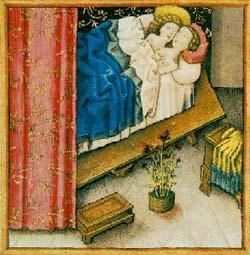 Regular attendance at lectures is strongly
recommended. While you can certainly complete the required
readings on your own, it is my job to help you make sense of them,
and students who do not attend class are likely to have a
difficult time doing well on exams.
Regular attendance at lectures is strongly
recommended. While you can certainly complete the required
readings on your own, it is my job to help you make sense of them,
and students who do not attend class are likely to have a
difficult time doing well on exams.
Lectures will begin promptly at 12:25. Students who choose the exam-only option should enter the lecture hall quietly between 12:15 and 12:20 so as not to disturb classmates taking the daily quiz. NOTE: If you choose to attend class, please plan to stay for the full class meeting. If there is a reason why you must leave class early, please speak to the instructor at the beginning of class. Please do not make a practice of leaving class early; it is disrespectful and distracting both to your instructor and to your classmates.
![]()
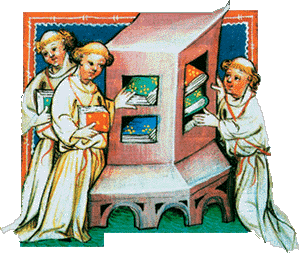
![]() Other required readings
will be accessed electronically:
Other required readings
will be accessed electronically:
![]()
![]() REQUIRED FILMS for
PERFORMANCE ANALYSIS COMPONENT OF CLASS: as an Area
C1
GE class, ENGL 252 must include attention to non-verbal art
forms such as the visual and/or performing arts. As
part of our unit on Shakespeare's A
Midsummer Night's Dream, all students will be
responsible for screening at least two filmed versions of the
play, one on their own time prior to T
(first class meeting of the unit on Shakespeare), and one in
class (spread over our class meetings weeks 9-10).
REQUIRED FILMS for
PERFORMANCE ANALYSIS COMPONENT OF CLASS: as an Area
C1
GE class, ENGL 252 must include attention to non-verbal art
forms such as the visual and/or performing arts. As
part of our unit on Shakespeare's A
Midsummer Night's Dream, all students will be
responsible for screening at least two filmed versions of the
play, one on their own time prior to T
(first class meeting of the unit on Shakespeare), and one in
class (spread over our class meetings weeks 9-10).
![]()
You are expected to have an email account and to check it regularly. Important announcements will be sent over the class email alias. Class email aliases are automatically generated using the email address of each enrolled student found in the Cal Poly Directory server. If your Cal Poly email account is NOT your preferred email address, you must
![]()
![]() PREPARATION FOR CLASS MEETINGS:
PREPARATION FOR CLASS MEETINGS:
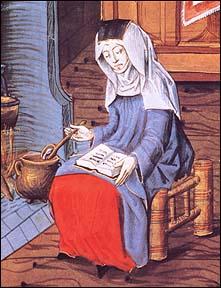 Readings are to be
completed BEFORE coming to class on the date assigned.
Assigned background readings should ideally be read first; they
are the context within which primary readings (the Great Books
themselves) will be most meaningful. Please note that this
background material is an integral part of the course and
will be covered on exams (and quizzes if you elect the Quiz
Option). When reading the primary texts, don't forget to read the
footnotes, which are provided because there is something in the
text which would otherwise be hard to understand.
Readings are to be
completed BEFORE coming to class on the date assigned.
Assigned background readings should ideally be read first; they
are the context within which primary readings (the Great Books
themselves) will be most meaningful. Please note that this
background material is an integral part of the course and
will be covered on exams (and quizzes if you elect the Quiz
Option). When reading the primary texts, don't forget to read the
footnotes, which are provided because there is something in the
text which would otherwise be hard to understand.
For most reading assignments, Study Questions will be provided to guide your reading. USE THEM!! As a rule, the study guides will contain a number of general questions covering background information on the author or work, followed by some thematic or plot-related questions concerning the primary readings. Familiarize yourself with the study questions before you begin to read, and refer to guide frequently AS you read, jotting down notes as you go along. Upon completing the reading and after lectures, reread the questions and make a few notes about them, since this will help you review for exams.
Note that length and difficulty of assignments vary, so look ahead in the reading list when you are planning your time. You are responsible for all assigned readings and for any additional material covered in lectures.
![]()
![]() Course Grade Calculation:
Course Grade Calculation:
The final course grade will be calculated based upon the Grading
Option you elect the second week of class.
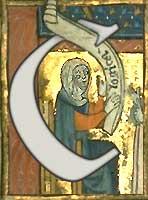 |
EXAM ONLY OPTION: | QUIZ + EXAM OPTION | |
100% of course
grade is based on the total number of Exam Points earned
(out of 350, based on two 100-pt. midterms and the 150-pt.
final exam). This percentage score is converted to a
letter grade according to standard practice:
|
30% | Reading Quizzes.
|
|
| 40% | Miderm Exams (20% for each exam) | ||
| 30% | Final Exam | ||
A NOTE ON QUIZ SCORES: If you elect the Quiz + Exam option, please remember that quiz points and exam points are not equivalent, since the percent scores awarded on quizzes have been artificially inflated (an average of 10 correct answers on the 15-pt. quizzes is recorded as a quiz score of "100%" rather than the actual percent score, 66%). A score of 100% on a 100-pt. objective midterm means 100 of 100 exam questions are correct, while "100%" on a "10-pt." quiz means 10 of 15 quiz questions are correct -- and quizzes are worth significantly less than exams. You therefore cannot calculate your final course grade directly from the raw percentage grades earned on quizzes and exams. For this reason (and also because so many students finish the quarter with quiz averages above "100%"!), I convert the scores on all components of the class to a 4.0-scale before calculating the final course grade. Everyone whose quiz average is more than 10 pts. out of 15 will receive a bonus in the form of a quiz grade above the normal maximum grade of 4.0. The amount of this bonus (from .05 to .3) will be commensurate with the strength of the quiz average relative to other students who elect the Quiz Option.
![]()
A Final Word: While I certainly hope you will find the readings enjoyable and my lectures entertaining, my job is to teach -- and yours is to learn. You will get more out of this large-lecture class if you keep up with reading assignments, attend lectures, actively engage with the materials. You are also advised to learn background information as we go along (as the Quiz option encourages you to do). Too much is covered to make for easy cramming immediately before an exam. I promise that I will do my best to make the material interesting and enjoyable. And, for what it's worth I LOVE teaching this stuff, and I'm told that my enthusisam makes my lectures fun.
Welcome, and enjoy!
 Contents
of this and all linked pages Copyright Debora B. Schwartz,
1999-2016
Contents
of this and all linked pages Copyright Debora B. Schwartz,
1999-2016
Send me mail